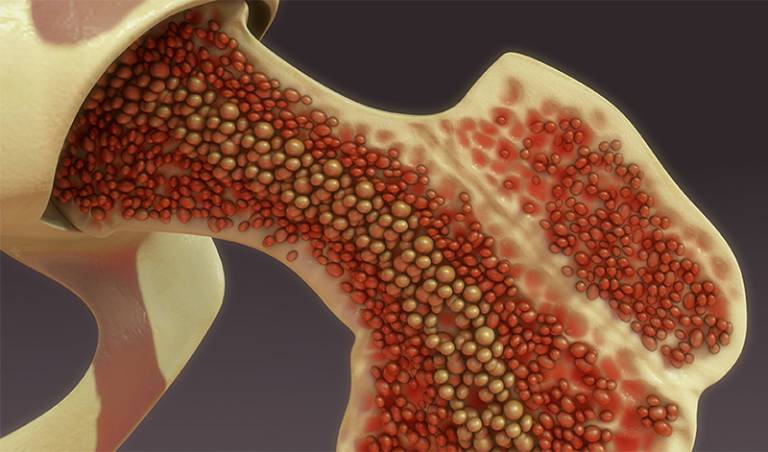Cancer-fighting immunotherapy improved in bone marrow
20 April 2018
Immunotherapy treatments could become more effective with a new technique developed by a UCL-led team that helps the cancer-killing immune cells embed into the patient’s bone marrow.

Immunotherapy is a rapidly growing area of cancer research, focused on enabling the patient’s own immune system to attack cancer. One such treatment involves extracting T cells (a type of white blood cell) from a patient’s blood and genetically reprogramming them to seek out and kill cancer. Trials of modified T cells have shown success in treating certain blood cancers, and treatments have now been approved for use in some patients.
A key challenge to this type of immunotherapy treatment is that the cancer-killing T cells don’t always live long enough in the body to be effective. Current methods of extending the life of these reprogrammed T cells include ‘conditioning’ with chemo- or radiotherapy to to aid engraftment and survival of transferred cells. But these approaches are associated with significant risks to already sick patients and only have variable success in ensuring the persistence of adoptively transferred T cells.
In the new study published in the Journal of Clinical Investigation, the research team devised a new approach, which uses bone marrow, the primary site for the production of blood cells, to help the modified T cells survive for longer. They found that bone marrow contains unique areas that nurture the cancer-killing cells and help them survive.
The research team modified T cells to express a protein called CXCR4 that helps them ‘home’ to the bone marrow. In experiments performed in mice, they found that CXCR4-expressing T cells quickly entered the bone marrow and then, multiplied rapidly so that their numbers were often increased by 100-fold compared to the normal T cells after a few weeks.
Furthermore, the researchers also found that the CXCR4-enhanced T cells were more effective than the control treatments at targeting lymphoma in mice and improved survival.
The researchers hope their technique could be used in multiple immunotherapies to improve their long-term success.
Lead researcher, Prof Ronjon Chakraverty, Professor of Haematology and Cellular Immunotherapy at UCL, said: “Our discovery is very exciting because it paves the way for new treatments that will get these cancer-killing white blood cells to be more effective. We are now eager to start clinical trials to see how this approach works in patients with cancer.”
This work has been done in collaboration with Imperial College London with support from the MRC, Bloodwise and the Wellcome Trust.
Media contact
Chris Lane
Tel: +44 (0)20 7679 9222
Email: chris.lane@ucl.ac.uk
Further information
- Research paper ‘Redirection to the bone marrow improves T cell persistence and antitumor functions.’ The Journal of Clinical Investigation
- Professor Ronjon Chakraverty academic profile
- Professor Ronjon Chakraverty clinical profile
- UCL Institute of Immunity and Transplantation
- Lo Selso Lab - Imperial College London
- Wellcome Trust Pathfinder Awards
- Source: UCL Media Office and Wellcome Trust
 Close
Close

